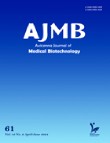New Hopes for Treatment of Alzheimer's Disease
Author(s):
Article Type:
Editorial (دارای رتبه معتبر)
Abstract:
Alzheimers Disease (AD), the leading cause of dementia worldwide, is an irreversible progressive neurodegenerative disorder characterized by cognitive impairment and functional disability 1,2. Devastating nature of AD leads to serious social and economic impacts on the healthcare systems which implies the necessity of its proper management. It has been demonstrated that patients quality of life and their overall prognosis has a significant negative correlation with the severity of AD. Patients with severe AD need full-time care and assistance with some basic activities of daily living such as feeding and dressing in addition to severe deterioration in various domains of their cognitive functioning. Moreover, behavioral aberrancy and neuropsychiatric symptoms such as depression, apathy, psychosis, agitation, and aggression are observed more frequently in moderate to severe AD. Despite such an enormous burden, most practical guidelines focus on mild to moderate stages of the illness and there is still a serious lack of evidence regarding the management of severe AD. Among currently FDA-approved drugs, very few medications have shown to be effective in attenuating some of the AD-related symptoms in severe stages. Memantine, an N-methyl-D-aspartate (NMDA) receptor antagonist, and donepezil, an acetylcholinesterase inhibitor (ACEI) are the most widely accepted agents in this regard. Unfavorable side effects of these agents along with lack of optimal efficacy have led to many researches trying to find novel pharmacologic strategies for AD based on its underlying pathophysiological defects 3.
More than 400 clinical trials are currently looking at new treatments for AD and many of them are actively recruiting. Many of these studies are based on decreasing the harmful effects of a toxic protein called amyloid-beta in the brain, but others reflect a broadening range of possible treatment approaches based on other theories about AD.
For example, the importance of inflammation in exacerbation of amyloid-betas neuron-destroying effects has led to trials of medications with anti-inflammatory properties 4.
Serotonin neurotransmission failure is a demonstrated aspect of AD, and several experimental medications attempt to correct that problem. RVT-101 and LuAE58054 are two examples of medications that are in clinical trials. Altering the brains serotonin activity seems to help cognitive difficulties in schizophrenia, and may also prove helpful in cognitive difficulties associated with AD 5. In conclusion, a number of biotechnologists are working on effective drugs for treatment of AD and in particular severe type.
More than 400 clinical trials are currently looking at new treatments for AD and many of them are actively recruiting. Many of these studies are based on decreasing the harmful effects of a toxic protein called amyloid-beta in the brain, but others reflect a broadening range of possible treatment approaches based on other theories about AD.
For example, the importance of inflammation in exacerbation of amyloid-betas neuron-destroying effects has led to trials of medications with anti-inflammatory properties 4.
Serotonin neurotransmission failure is a demonstrated aspect of AD, and several experimental medications attempt to correct that problem. RVT-101 and LuAE58054 are two examples of medications that are in clinical trials. Altering the brains serotonin activity seems to help cognitive difficulties in schizophrenia, and may also prove helpful in cognitive difficulties associated with AD 5. In conclusion, a number of biotechnologists are working on effective drugs for treatment of AD and in particular severe type.
Language:
English
Published:
Avicenna Journal of Medical Biotechnology, Volume:10 Issue: 1, Jan-Mar 2018
Page:
1
magiran.com/p1769245
دانلود و مطالعه متن این مقاله با یکی از روشهای زیر امکان پذیر است:
اشتراک شخصی
با عضویت و پرداخت آنلاین حق اشتراک یکساله به مبلغ 1,390,000ريال میتوانید 70 عنوان مطلب دانلود کنید!
اشتراک سازمانی
به کتابخانه دانشگاه یا محل کار خود پیشنهاد کنید تا اشتراک سازمانی این پایگاه را برای دسترسی نامحدود همه کاربران به متن مطالب تهیه نمایند!
توجه!
- حق عضویت دریافتی صرف حمایت از نشریات عضو و نگهداری، تکمیل و توسعه مگیران میشود.
- پرداخت حق اشتراک و دانلود مقالات اجازه بازنشر آن در سایر رسانههای چاپی و دیجیتال را به کاربر نمیدهد.
دسترسی سراسری کاربران دانشگاه پیام نور!
اعضای هیئت علمی و دانشجویان دانشگاه پیام نور در سراسر کشور، در صورت ثبت نام با ایمیل دانشگاهی، تا پایان فروردین ماه 1403 به مقالات سایت دسترسی خواهند داشت!
In order to view content subscription is required
Personal subscription
Subscribe magiran.com for 70 € euros via PayPal and download 70 articles during a year.
Organization subscription
Please contact us to subscribe your university or library for unlimited access!


